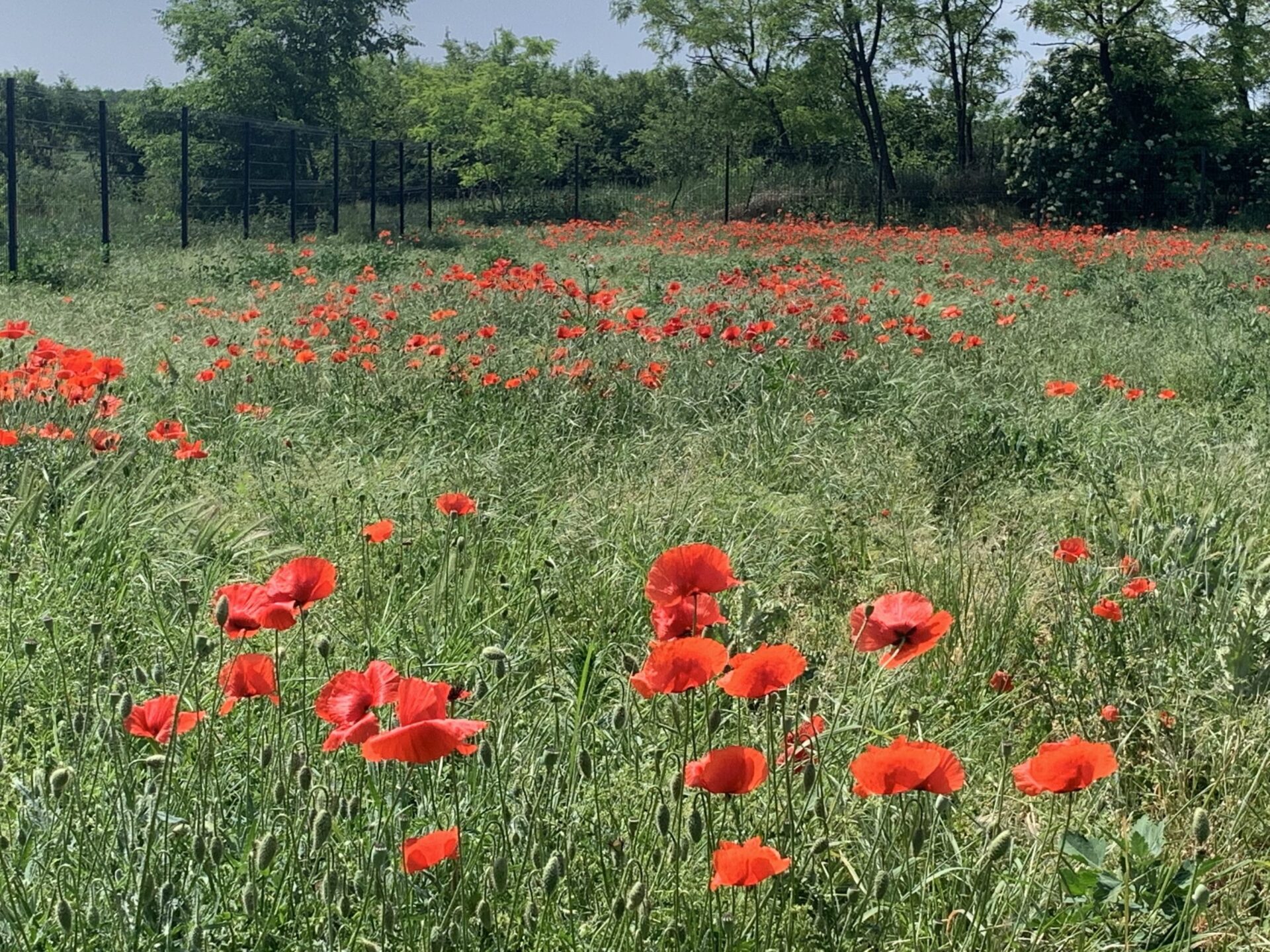Here’s what I read this month, from a novel set in Cyprus and partly narrated by a fig tree to an exploration of the importance of disorder in cities.
May has been a beautiful month here in Serbia. Everything bloomed all at once, and I let my back garden go wild and discovered the sea of poppies shown above.
Since this photo was taken, the poppies have been joined by some as yet unidentified yellow and purple wildflowers, along with some less welcome visitors like nettles and thistles. The garden is full of bees from the hives of the man two doors down who makes honey for the local market, and the storks are clacking in their nests overhead, while a cuckoo somewhere keeps hooting regularly, sounding just like a cuckoo clock.
Anyway, I have also done plenty of reading this month. Here’s a summary.
The Last Night at the Ritz by Elizabeth Savage
This one was a recommendation from Emma, and I’m grateful for it. It’s a 1973 novel that I would never have read otherwise, both because I’ve never heard of the writer and because the premise—a bunch of rich friends meeting at the Ritz to reminisce—didn’t grab me at all. But it’s beautifully executed, and I ended up really enjoying it. I hope to post a review soon, but in the meantime you can read Emma’s review to find out more about the book and see how she convinced me to take a chance on it.
We Want Everything by Nanni Balestrini
This is a fictionalised account of the wave of strikes that swept across Italy’s factories in 1969. I found it interesting as a historical narrative, but not particularly interesting as a novel—there’s a lot of detail about all the strikes and demands, and not much character development. It felt to me more like oral history. I was intrigued to learn that the author was the real-life inspiration for the character of a revolutionary who escapes Italy by skiing across the Alps in Rachel Kushner’s novel The Flamethrowers.
Beyond the Ruins: The Fight Against Environmental Breakdown, ed. Mathew Lawrence and Laurie Laybourn-Langton
This is a free ebook by Verso, a collection of essays by various environmental activists about how we fight against environmental breakdown. I agreed with most of it but didn’t really feel as if I discovered anything new. It felt like the stuff people with sense have been saying for decades, but I don’t see how we’re going to get it done in the face of determined opposition from a minority of immensely rich and powerful men who are still clinging to fossil fuels with their cold, dead hands.
The Island of Missing Trees by Elif Shafak
Elif Shafak is one of those writers who never seems to produce a bad book. Honour is probably her most famous novel, but my favourite is the oddly named 10 Minutes 38 Seconds in This Strange World, which made my list of the best books I read in 2019. Her latest, The Island of Missing Trees, tells the story of a Greek/Turkish couple who fall in love just as Cyprus is fragmenting. It’s also partly narrated by a fig tree. I enjoyed and admired it, but not as much as those other two I mentioned. The issues seemed to take over a little from the characters at times. But it’s still a great read.
Disgrace by J.M. Coetzee
This was a bleak read. Quite beautiful at times, but very bleak. Everything that happens is awful, and the ways in which the characters react to the awful events are often bizarre and, to me, unrealistic. I can understand why Coetzee won the Nobel Prize for the way he writes and the challenging themes he deals with, but still I wanted to throw my Kindle across the room a few times.
Designing Disorder: Experiments and Disruptions in the City by Richard Sennett and Pablo Sendra

There’s a tension in cities between vibrancy and security, and security is winning. Public spaces are being closed off and put under surveillance, and residential communities and public buildings are being designed like fortresses to keep out the dangerous world. But what if things were different? I enjoyed this plea for a more fluid, disordered type of city in which different types of people can interact instead of being kept segregated from one another. There are also some specific architectural ideas illustrated by plans and illustrations, although they were tough to interpret in my Kindle version.
How Was Your Month?
Enough about me. Tell me how your month has been in the comments. And if you’d like to share some book recommendations too, those are always welcome!









There are 13 comments
Nice diversity here!
Narrated by a fig tree? This book sounds more and more interestting!
oops, interesting of course
Yes, it’s a clever device, Emma. The fig tree has witnessed many of the key moments of the original story in Cyprus in 1974, and then one of the characters takes a cutting to Britain where the tree grows and acts as a holder of memories and a symbol of the difficulty of transplanting and putting down roots in foreign soil.
The poppies are beautiful! We also have a patch of nettle in the wild part of our yard. We live at the edge of some woods so it is difficult to keep our yard tamed. You read a nice variety of books in May. Designing Disorder sounds intriguing. Have a great June!
Thanks Gretchen! Yes, we have a similar issue—we’re on the edge of acres of farmland, with bits of wild land and forest in between and a river beyond, so all sorts of seeds must be blowing in on the wind. Our first year here I tried to keep it neat, but this year I’ve let it go wild and am delighted with the results. It’s also easier on my back 😉
A fascinating selection of books, Andrew, and very different from the ‘usual suspects’ that many other bloggers are reviewing at the moment! I read Disgrace several years ago with my book group, and while much of the detail has slipped from my mind I do remember feeling disturbed (and maybe a bit manipulated) by it. I’ve also shied away from reading Damon Galgut’s critically acclaimed, The Promise, for similar concerns… The Last Night at Ritz sounds great though, so I’ll keep it in mind!
Yes, I had a similar reaction to Disgrace, Jacqui! In fact, those words you chose, “disturbed” and “manipulated”, helped me to clarify the parts of the book I didn’t like. I don’t so much mind the “disturbed” part because the novel is clearly dealing with some difficult subject matter, and being forced to think about disturbing things is OK with me. But it’s the “manipulated” part that bothered me more. Those were the parts that made me want to throw my Kindle across the room—when characters behaved in completely unbelievable ways that seemed designed to reinforce an idea. I hadn’t thought about it in terms of manipulation, but yes, that’s how it felt in those moments.
Love the cover of The Island of Missing Trees. Looks like you did get some good reading done. Have a great June!
https://lisalovesliterature.bookblog.io/
Yes, it’s a beautiful cover, isn’t it? I mostly read on Kindle these days, so I don’t get the full benefit of all the beautiful cover designs out there. When I write about the books on my blog, it’s often the first time I’ve really paid attention to the cover.
I am on the waitlist for The Island of Missing Trees and am very much looking forward to reading it. A book narrated by a tree? Yes please! Designing Disorder sounds super interesting.
Yes, I think you’ll like that one! The tree only gets to narrate short chapters, but there are quite a lot of them throughout the book, and they bring quite a different perspective to the story. Designing Disorder is also a good one, and I think it would be better in the paper version—one of the coauthors is an architect, and the book contains some very detailed architectural drawings of better cities, which looked interesting but were pretty much impossible to decipher on my Kindle.
A book narrated by a fig three. Wow that sounds cool.
Have a great June reading month.
Thanks Ann! Yes, it’s a pretty cool technique, and it works really well for symbolising the divisions in Cyprus and the difficulty of putting down roots in a new country. Thanks for visiting, and I hope you discover some wonderful books in June too!